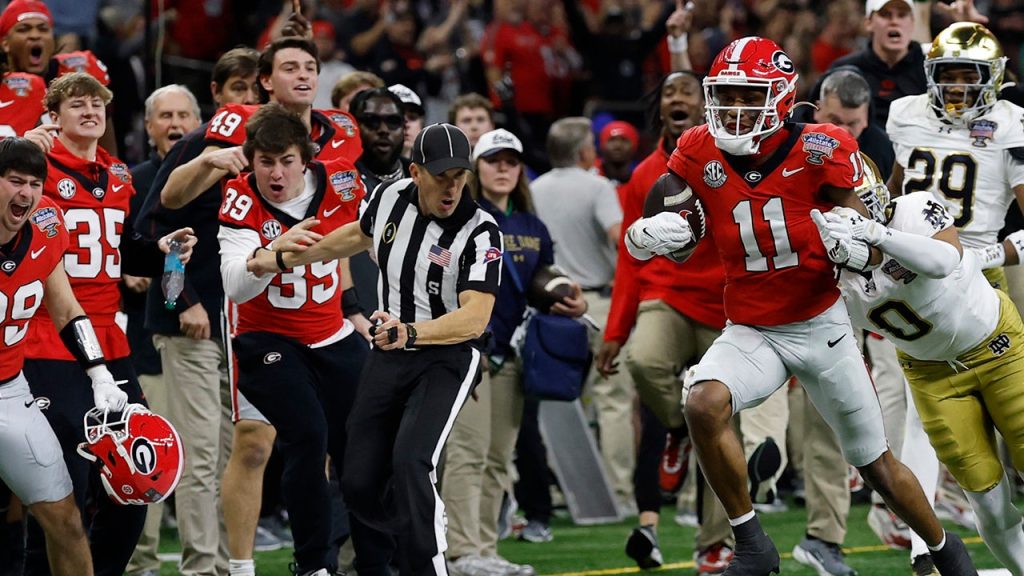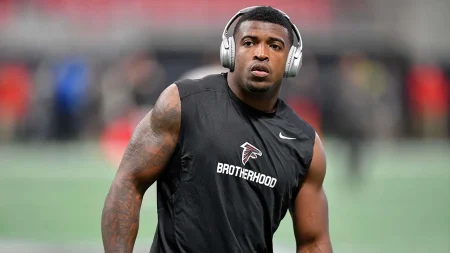The Unfortunate Incident: A Costly Sideline Mishap
In the high-stakes arena of college football, moments of triumph and despair often hinge on the smallest of margins. Such was the case for the Georgia Bulldogs in their College Football Playoff quarterfinal clash against Notre Dame in the Sugar Bowl. While the game itself was a hard-fought battle, one particular incident involving redshirt sophomore cornerback Parker Jones became a focal point of discussion and a source of frustration for the Bulldogs. Jones, while inactive for the game, found himself at the center of a bizarre penalty that cost his team 15 crucial yards.
The incident unfolded during the second quarter with the score still knotted at zero. Georgia quarterback Gunner Stockton connected with wide receiver Arian Smith for an impressive 67-yard gain, seemingly injecting much-needed momentum into the Bulldogs’ drive. However, the ensuing celebration on the sideline took an unexpected turn. Jones, caught up in the excitement of the play, inadvertently stepped onto the field and collided with an unsuspecting official. This seemingly innocuous act resulted in an interference penalty, negating the impressive gain and pushing Georgia back.
The Aftermath: A Coach’s Perspective and a Player’s Regret
Head coach Kirby Smart, initially unaware of the player responsible for the penalty, addressed the incident after the game, labeling it an "undisciplined, self-imposed wound." While acknowledging the unfortunate circumstances, Smart emphasized the importance of avoiding such mistakes, especially in critical moments. Jones, undoubtedly regretting his actions, found himself the subject of widespread social media attention, a stark reminder of the high-stakes nature of college football.
While the penalty undoubtedly disrupted Georgia’s offensive rhythm, it would be an oversimplification to attribute the team’s eventual loss solely to this single incident. Georgia, despite outgaining Notre Dame in total yardage, struggled on crucial downs, converting only 2 of 12 third-down attempts and failing to capitalize on any of their three fourth-down opportunities. Moreover, a 98-yard kickoff return by Notre Dame to open the second half further hampered Georgia’s efforts to gain control of the game.
The Importance of Sideline Awareness and Discipline
The incident involving Parker Jones serves as a poignant reminder of the crucial role of sideline awareness and discipline in football. While emotions run high, especially during playoff games, players and coaches must remain cognizant of the rules and regulations governing sideline conduct. Even seemingly harmless actions, like stepping onto the field of play while inactive, can have significant consequences.
The white lines marking the boundaries of the playing field are not merely decorative; they represent a critical demarcation between active participation and observation. Encroaching upon this space, even inadvertently, can disrupt the flow of the game and potentially disadvantage one’s own team. This incident underscores the importance of educating players on proper sideline decorum and emphasizing the potential ramifications of even minor infractions.
The Broader Context: A Learning Experience for All
The unfortunate incident involving Parker Jones transcends the immediate context of the Sugar Bowl. It serves as a valuable learning experience for players, coaches, and officials alike. Players must remain vigilant about their positioning on the sidelines, ensuring they do not inadvertently interfere with the game. Coaches have a responsibility to reinforce these principles and ensure their players understand the importance of maintaining proper sideline conduct.
For officials, this incident highlights the need for clear communication and consistent enforcement of sideline rules. While unintentional contact may occur, officials must be prepared to address such situations promptly and fairly, minimizing the impact on the game. The goal is to maintain a fair and safe environment for all participants, ensuring that the focus remains on the competition itself.
Moving Forward: Lessons Learned and Future Implications
The incident involving Parker Jones should not define his career. It should, however, serve as a catalyst for greater awareness and discipline on the sidelines. By acknowledging the mistake and learning from it, Jones can emerge a stronger and more mindful player. This incident has the potential to be a transformative moment, not only for Jones but for the entire Georgia program.
Moving forward, it is crucial that teams across all levels of football emphasize the importance of sideline awareness and discipline. This incident serves as a stark reminder that even seemingly insignificant actions can have far-reaching consequences. By prioritizing sideline decorum and reinforcing the importance of adhering to the rules, teams can create a more focused and disciplined environment, maximizing their chances of success on the field.
The Human Element: A Moment of Misjudgment
Ultimately, the incident involving Parker Jones underscores the human element inherent in sports. Even at the highest levels of competition, players are susceptible to moments of misjudgment and lapses in concentration. While the consequences of such errors can be significant, it is important to remember that athletes are human beings, prone to mistakes like anyone else.
The key takeaway from this incident is not to assign blame or dwell on the past, but rather to learn from the experience and move forward with greater awareness and discipline. Parker Jones, like any athlete who experiences a setback, has the opportunity to use this incident as a springboard for growth and development, both on and off the field.










